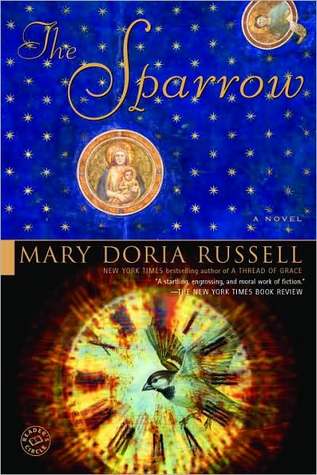This is not a “best books” list because I cannot hope to read everything that crosses my desk; this is an impressionistic rendering of five wonderful books I did get to read this year, in no particular order. I loved these and hope you will too.
(P.S. Honorable mentions to Rachel Marie Stone’s Eat with Joy and Nadia Bolz-Weber’s Pastrix.)
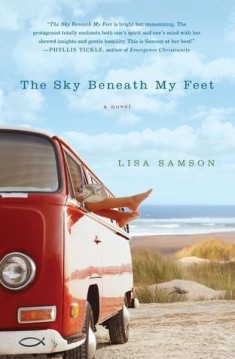 Lisa Samson, The Sky Beneath My Feet
Lisa Samson, The Sky Beneath My Feet
Earlier this month this book was named as Christianity Today’s Novel of the Year, and it’s a well-deserved honor. It’s the only piece of CBA fiction (fiction from a traditional evangelical publishing house) that made my list. It’s honest, even raw—not to mention funny and smart.
The novel portrays a pastor’s wife, Beth, who’s running adrift as many of the things she’s come to count on in her life begin falling to pieces. Her husband starts having a crisis of faith and withdraws from the family, physically moving himself out to the shed in the backyard. Beth is stunned to discover that some of the people around them are starting to regard her absent husband as a saint because he’s devoted himself to 24/7 prayer, even though their teenagers are in trouble and Beth’s not sure herself what parts of the Christian story she still believes. What, in the end, do Christians owe their families? The wider community? And how do we define ourselves as children of God if many of the outward trappings of the “Christian life” are stripped away?
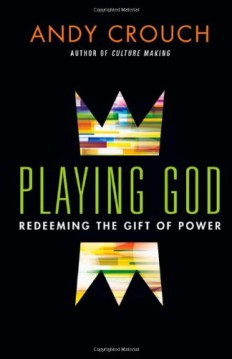 Andy Crouch, Playing God
Andy Crouch, Playing God
It’s not quite fair for me to blog about this book because I still have about 80 more pages to read in it. It’s taking me a long time, not because it’s not compelling but precisely because it is. It has for some weeks now been my “Sunday book”—a deeper theological read of the kind I generally reserve for unscheduled Sabbath evenings. I find I need to think about it and digest a chapter or two before picking the book up again.
The subtitle of this book is “Redeeming the Gift of Power,” which is apt; it is not just a diagnostic analysis of the uses and abuses of power, particularly in religion, but a prescriptive guide to the clear-sighted, constructive, and creative use of power. We have all heard the old maxim that all power corrupts, and absolute power corrupts absolutely; Crouch points out that any parent can tell you otherwise, or none of our helpless offspring would survive infancy. More to the point, if Christianity is true, then C. Wright Mills’s famous statement that the ultimate form of power is violence cannot also be true.
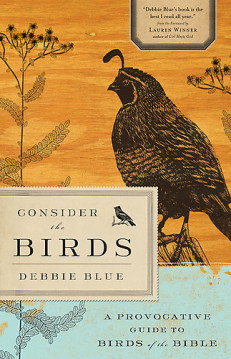 Debbie Blue, Consider the Birds
Debbie Blue, Consider the Birds
As I discussed on this blog a few months ago, I don’t know jack squat about birds except that they fly and mate and seem to enjoy crapping on my car. I certainly don’t know much about birds and religion, which Debbie Blue has spent a lot of time thinking about; the book’s subtitle suggests that it is a “provocative guide to birds of the Bible.”
Provocative, indeed. I read it months ago and am still thinking about it. It’s not a field guide so much as a theology manifesto about how the don’t-blink-or-you’ll-miss-them references to birds in the Bible can teach us some surprising things about God.
P.S. Debbie Blue is coming to Cincinnati on January 18 and 19 to speak at the Episcopal Church of the Redeemer.
 Mary Doria Russell, The Sparrow
Mary Doria Russell, The Sparrow
Wow, I do have a sort of bird theme going on this year, don’t I? I should say that putting this novel on the list is a sort of cheat because it’s actually two decades old and has become something of a modern spiritual classic, so much so that I finally caved this year after so many bookwormish friends kept recommending it.
It was well worth it: a novel rich in character, complexity, humor, and beauty.
It’s hard to describe, though. “Imagine if The Black Robe had been set in outer space,” I tried to explain to my husband. (Blank stare.) “Um, it’s a sci-fi novel about Jesuit missionaries who attempt to take the gospel to a newly discovered planet, but what happens there causes them to question the goodness of God.” (Marginally more interested eye contact.) There is no genre of “theological science fiction” (though there should be), so it’s challenging to describe this engrossing novel, set around the year 2060. The characters are unforgettable, the conclusion devastating.
Apparently there is a sequel to this book, but I’m not sure I am ready for it just yet, since I am still gloriously traumatized by The Sparrow.
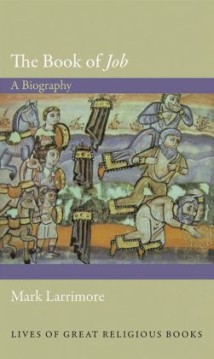 Mark Larrimore, The Book of Job: A Biography
Mark Larrimore, The Book of Job: A Biography
Just as I was putting the finishing touches on The Twible, I was assigned to interview professor Mark Larrimore about his new “cultural biography” of the Book of Job. I wound up liking his book so much that I cut one of my planned sidebars for The Twible and quoted from his book instead. I learned so much from it. Here’s an excerpt from the PW profile I wrote about Larrimore:
As part of Princeton University Press’s Lives of Great Religious Books series, The Book of Job is not a biblical commentary but a reception history that traces how philosophers, rabbis, poets, and others have interpreted Job through the centuries. Larrimore, a philosopher at Eugene Lang College The New School for Liberal Arts, says he is “interested in the presentation and conversation about Job.”
How people address Job in different eras, Larrimore suggests, reveals as much about the interpreters themselves as about Job. For example, centuries ago there was much hand-wringing about “why God gets into a wager with Satan in the first place. Is God playing dice?” And early rabbis “were often nervous” about the question of whether Job was Jewish.
Today, if anything, the ambiguity of Job’s religious identity is part of the book’s appeal. “Because Job has a relationship with God outside of the covenant, it makes him a quintessentially modern figure,” Larrimore explains. “Job stands alone facing God, and I think that’s true of many modern religious people.”
If you’re interested in excellent biblical commentary-that-is-not-commentary, this is just about perfect: an absorbing rehearsal of how Job has been interpreted through the ages, from Maimonides and Calvin to William Blake and Elie Wiesel.
